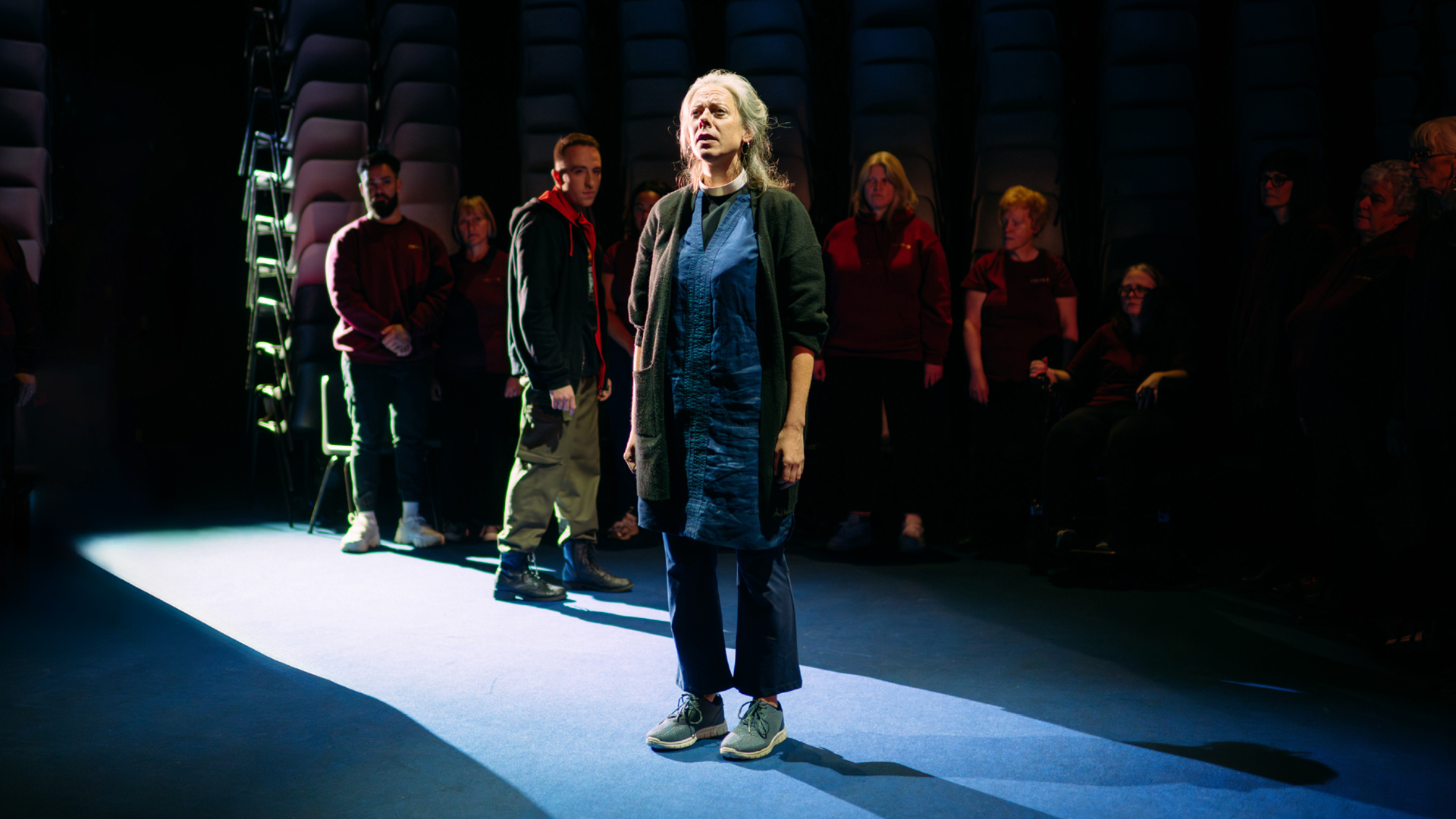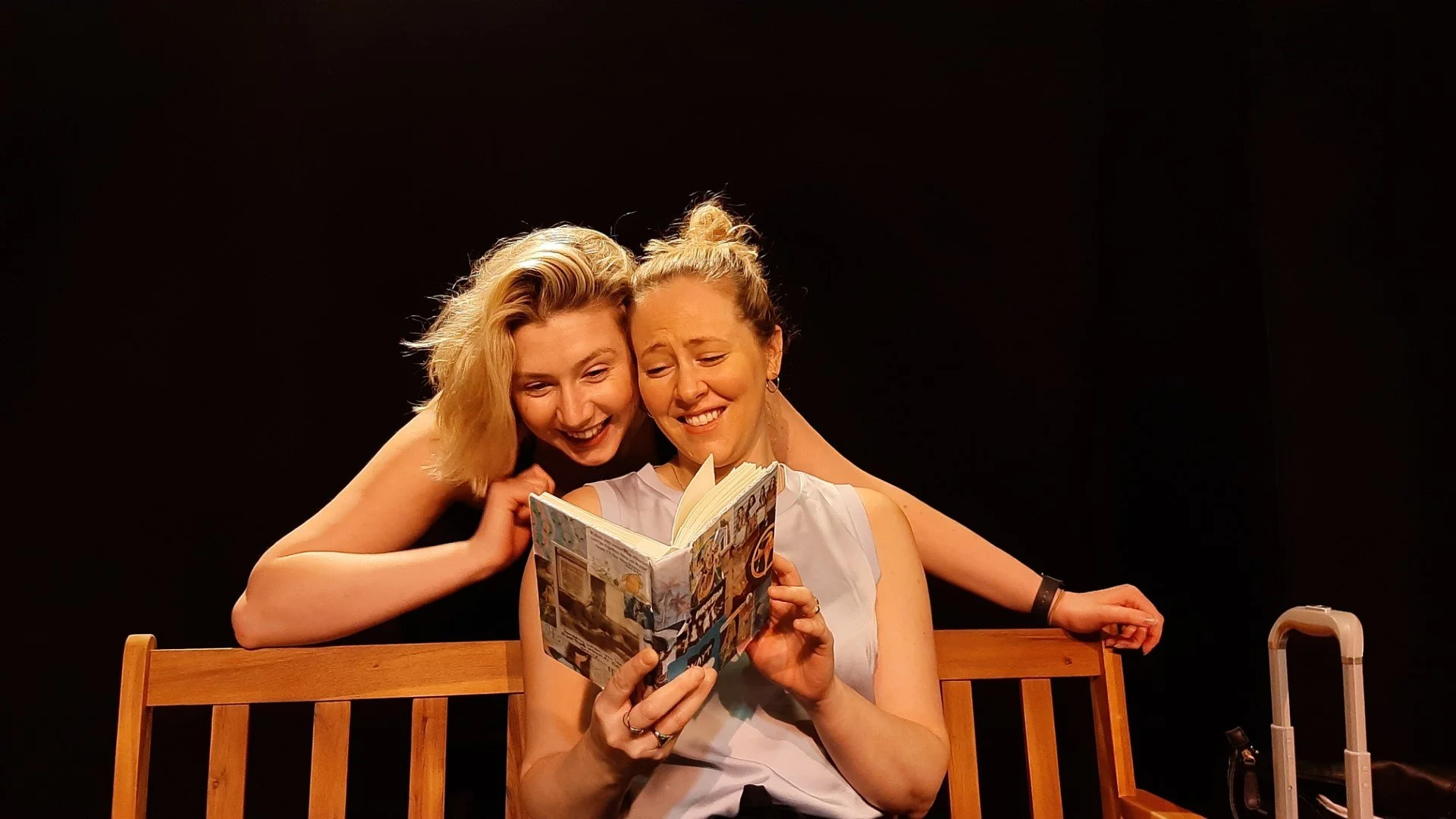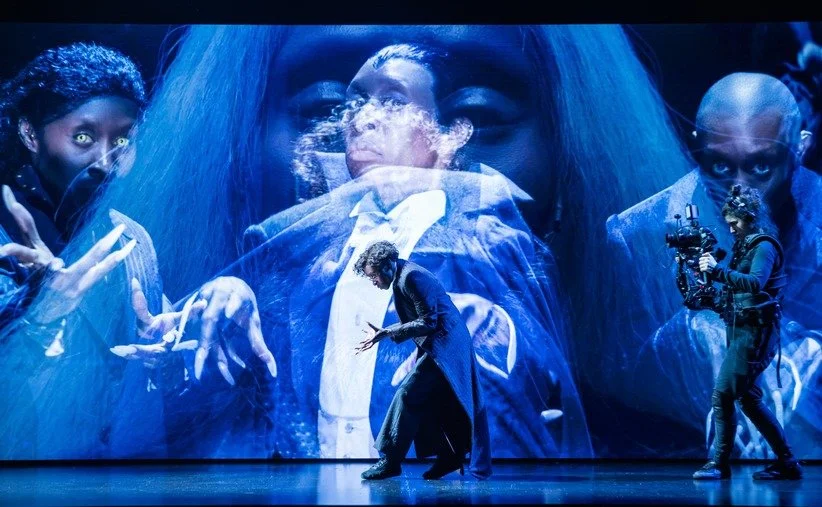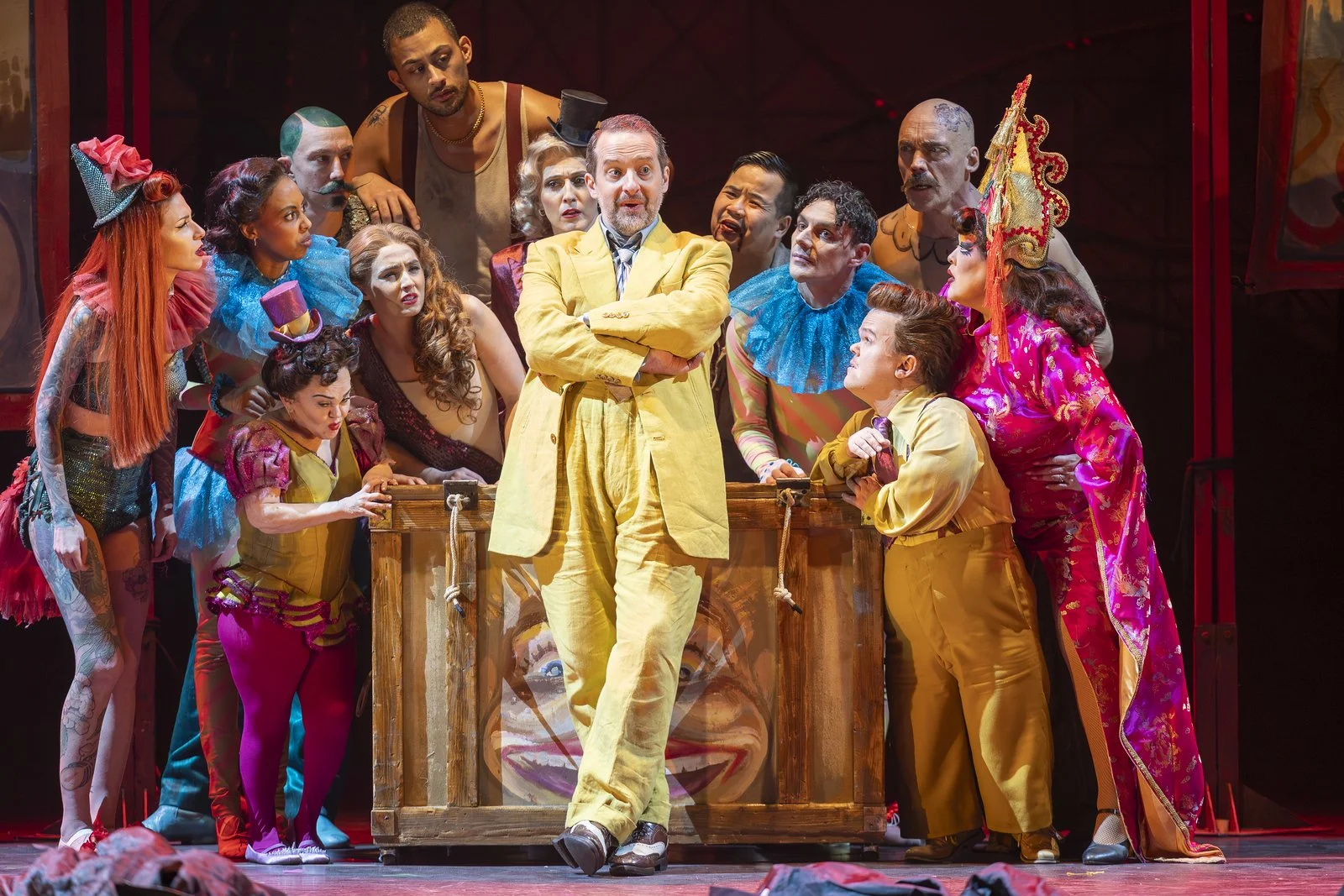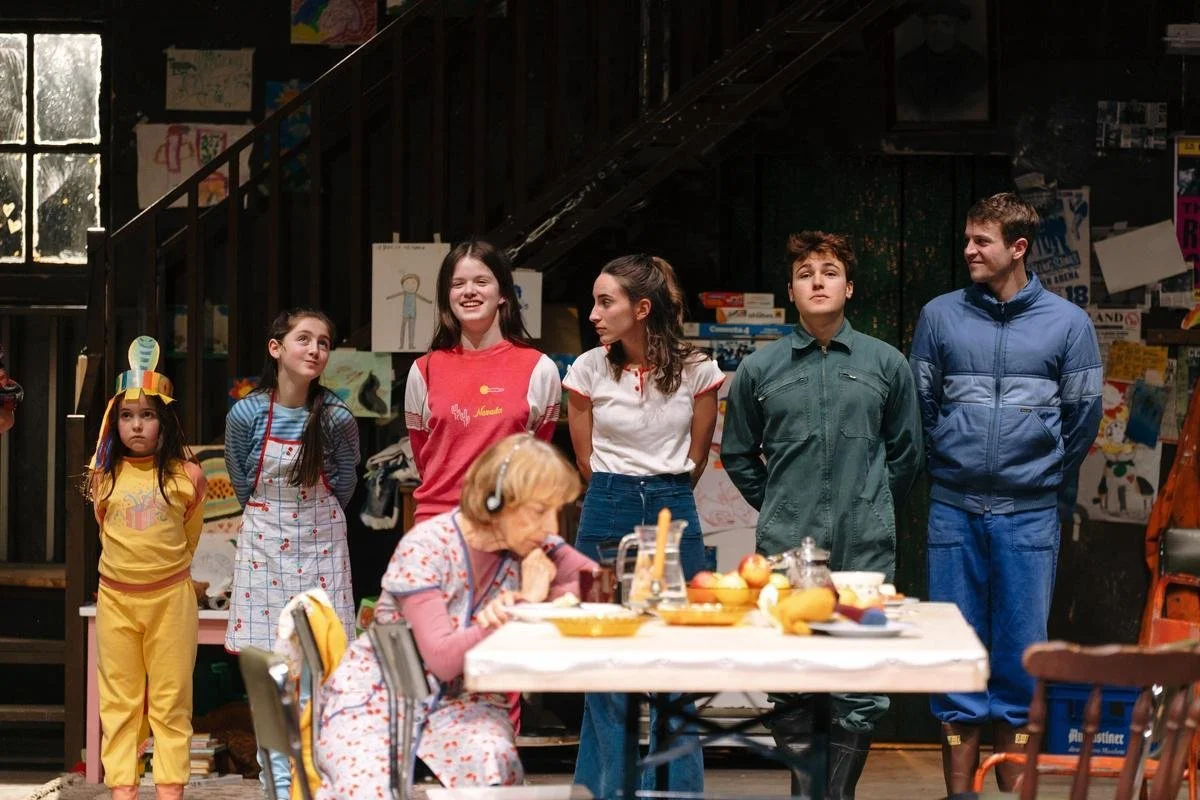Redlands, Chichester Festival Theatre Review
The cast of Redlands. Photo by Ikin Yum
Reviewed by Rosie for Theatre and Tonic
Disclaimer: Gifted tickets in exchange for an honest review
This production contains haze, flashing lights and the constant use of herbal cigarettes.
Living in the new age of social media “culture wars” and the 24/7 access to celebrities at the click of a button, nearly 60 years after one of the most infamous rock ‘n’ roll court cases of the 20th century it seems more timely than ever that Chichester Festival Theatre commissioned a play based on the local trial. Charlotte Jones and Justin Audibert (who makes his directorial debut at the Festival Theatre with “Redlands”) craft a well-rounded, surprisingly funny look into not only the lives of the celebrities who fell victim to the tabloid witch hunt, but the lives of the fans and team around them; the additional welcomed treat of the premiere is that it takes place in Chichester which sits just 9 miles north-east of West Wittering where the raid took place. Pairing a wonderful sense of homecoming with the events of the court case and some well-known songs, the Rolling Stones’ Redlands bust becomes a familiar story to everyone in the audience regardless of when you were born and whether you have any prior knowledge of the ins and outs of what happened in 1967; having seen unfortunately similar cases in the media today, it subtly begs the question - how have we not learned from all our past mistakes with media frenzy and sensationalism? Those unfamiliar with the 1967 Redland’s court case against Keith Richards and Mick Jagger may feel daunted to attend the rock ’n’ roll history play, but it is as entertaining a watch for those in the know as those discovering the event for the very first time.
One thing that Chichester Festival Theatre is going to do without fail is (in the words of the Rolling Stones themselves) “put on a show” in their uniquely wonderful main stage space. Taking a seat in the theatre, faced with the gleaming lights of a big, bold “R” and “S” (for both the Rolling Stones and Redlands) framing the stage, Joanna Scotcher’s set design and colours throw you into the midst of the brown, earthy hues of the era of the 60s. A gaudy curtain hides a second platform at the back of the stage and sets a backdrop to the opening scenes of the show, an almost play within a play quickly followed by the introduction to the Redlands house itself. Wonderfully versatile, the space allows for quick, seamless changes between settings and feels like a warm, welcome embrace into the world with how open the theatre is. Audibert takes this a whole step further in welcoming the audience into the world of the Rolling Stones case, directing actors to use the entire auditorium to enter, exit and sit amongst the crowd. There is not an inch of the theatre that is not utilised to make the crowd feel as if they are part of the heard of fans outside of the court, watching a concert or catching the same play as Nigel Havers; supported by an enthusiastically energetic ensemble, it it hard not to feel completely involved in the story. There is something so wonderful about how Audibert and Scotcher welcome the audience into Jones’ work that allows for a sense of ease of understanding of everything happening, regardless of your prior knowledge of the names involved. It is a beautiful sight to see how the show relinquishes the divide between old and young, and how art and being a fan is a universal experience that can be shared by all. Whilst at times it can feel like it is taking on too much by threading together three large portions of one bigger story, it still manages to make time slip away with ease.
Photo by Ikin Yum
Tackling a role in the debut of a play is daunting enough in the world of theatre, setting the precedent for what this character is and should be within the confines of the script, but taking on the role of a well-known figure in society comes with an added pressure; mannerisms, accents, gait are all embedded into a celebrity image and so is non-negotiable when someone adopts their persona for a show. Braving the stage as some of the most famous rock ’n’ roll figures in history are Jasper Talbot (who makes his exceptional professional debut as Mick Jagger), Brenock O’Connor (Keith Richards) and Emer McDaid (Marianne Faithfull). Talbot and O’Connor, supported by the incredible band of musicians behind them, deliver wonderfully fluid interpretations of Jagger and Richards respectfully. Talbot embodies the Jaggerisms wholeheartedly in a fantastic fictional version of the 60s rock star, and marks quite an incredible debut for the young actor, whose appearance uncannily resembles that of the young rockstar. Supported by O’Connor’s Richards with his bitter wittiness and knack for comic timing, they give the audience exactly what they’re there for: a show. They are a perfectly suited dynamic duo who elevate each other’s performances with charm and energy, particularly when falling into song. “Can I Get a Witness” brings the first act to a close, falling so neatly and riotously into place in the midst of the Redlands trial. Particular praise should be afforded to the incredible McDaid as Faithfull. Faced with the ‘curse’ of being in the spotlight, Faithfull tackles not only the harsh realities of being caught up with the Redlands bust but is subjected unjustly to larger media scrutiny as a woman and girlfriend of Jagger. McDaid handles the complexities of what it means to be a woman in the eyes of the press, the target of irrational fan hatred, and misogyny in the world of law with graceful ease. She spends each moment on stage capturing your full attention, demanding her story as the fictionalised Faithfull to be heard with open ears. Her portrayal is sympathetically honest, especially to an audience who likely have been all-too familiar with more recent public scrutiny over figures such as Megan Markle, targeted by media and public alike.
Equally as captivating, Louis Landau as Nigel Havers assumes the role of the narrator and walks the audience through the show with a comforting presence. He bridges the divide between the fan and the celebrity, audience and actor, and Landau’s wholly likeable performance as Havers allows for the cultural and societal barriers to be broken down so the two sides to see eye to eye - much like the breaking of the fourth wall. Landau takes the script and Audibert’s direction, becoming the beating heart and soul of the show. Through him, we see behind the closed off walls to the celebrity, a glance inside a household where family and society expects one thing and he is being pulled in a different direction, and the brief discussion around what it means to be young and discovering yourself. The Rolling Stones represent a part of Nigel that is yet to be accepted by his father, and the show’s fantastical nature of including song and fourth-wall breaking to an eventual change in the mindset of Michael Havers (played by Anthony Calf) allow this to unfurl in a perfectly paced examination of the ability to change for the better. This is entirely down to the brilliance of Calf, who captures the moment where one must examine who he is and who he wants to be, using the Stones case as a personal metamorphosis. Some of the strongest moments of the play are when the role of celebrity is cast aside and we are left with the Havers family laying bare the issues they are facing, no doubt due to the comforting, maternal presence of Olivia Poulet as Carol Havers and joyous Clive Francis as Cecil “Bongo” Havers.
There is much to be said about celebrity culture and the media, and I think Redlands triumphs wholeheartedly in capturing the tricky relationship between media, truth and scrutiny. It tackles the reality of not knowing a celebrity outside of their public persona, how existing prejudices can and should be changed amongst generations, and the culture of celebrity is a key role in the foundations of expression and self. Audibert’s director debut at the Festival Theatre is a show like no other I have seen at CFT; it is a remarkable piece, one as relevant now in its fictitious stage format as the true Redlands court case was back in the 1960s, filled to the brim with moments of joyous laughter and moments of hard-hitting truth that come at you like a well-rehearsed setlist at a concert. Despite the nearly 3-hour run time and the need to tighten a few areas of transition, the time flies by in a riotous flurry of youthful energy, toe-tapping tunes and irresistible performances that should not be missed.
ACCESS NOTES:
The Festival Theatre is a fully accessible space with lift access. Accessible toilets have audio-visual assistance for those with visual impairments that may need descriptions of where objects are in the space. CFT’s access scheme is easy to navigate and they offer a wide range of accessibility options to patrons, including but not limited to “Buddies” for those who do not feel comfortable attending the theatre alone, touch tours before certain performances and specific seat descriptions for those who need larger seats or specific requirements. See Chichester Festival Theatre’s dedicated Access page for more information.
At Chichester Festival Theatre until 18 October.
☆ ☆ ☆ ☆



